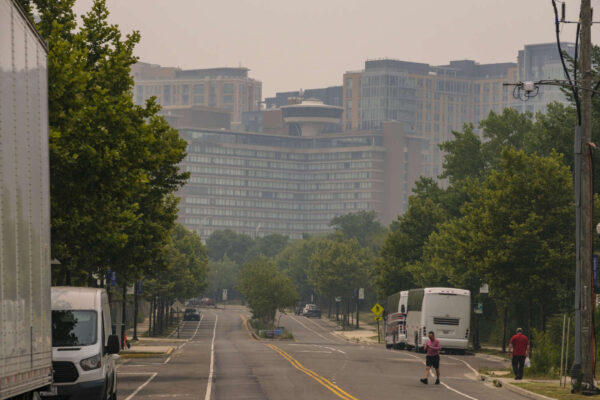
The bulk of today’s storms are moving out — and more Canadian wildfire smoke is about to move in.
The smoke that enveloped Chicago and much of the Midwest today is set to push east toward our region. That has prompted a Code Orange air quality alert for the D.C. area tomorrow (Wednesday).
Code Purple (very unhealthy) air quality stretches from Iowa thru northern Illinois, southern Wisconsin, and much of Michigan today. Code Red surrounds in much of the Great Lakes.
Another choking pall of smoke from Canadian boreal fires. #summerofsmoke https://t.co/RHLjckUGJY pic.twitter.com/tJeJPrZbM7
— Capital Weather Gang (@capitalweather) June 27, 2023
Code Orange indicates that time spent outdoors could be unhealthy for sensitive groups, but it’s not as bad as earlier this month when the air quality measurement for Arlington hit Code Maroon, the worst and most hazardous level.
More from a Metropolitan Washington Council of Governments press release, below.
The Metropolitan Washington Council of Governments (COG) has forecast a Code Orange air day for the metropolitan Washington region tomorrow: Wednesday, June 28. Smoke coming from wildfires in Canada will contribute to the increased levels of fine particle pollution. The Code Orange levels mean the air is unhealthy for sensitive groups, including older adults, children, and people with heart or lung disease.
On unhealthy air days, COG advises the following health precautions:
- Children and older adults should reduce outdoor activities.
- Individuals with respiratory and heart ailments, emphysema, asthma, or chronic bronchitis should limit their activity level. If breathing becomes difficult, move indoors.
- Healthy individuals should limit strenuous work or exercise, especially outdoors.
Residents can check current air quality conditions on COG’s website or by downloading a free air quality app from Clean Air Partners.
COG provides air quality forecasts and current air quality conditions for metropolitan Washington. It also educates the public about voluntary actions people can take to reduce pollution and the health risks of bad air quality through its Clean Air Partners program, which is co-sponsored by the Baltimore Metropolitan Council.

